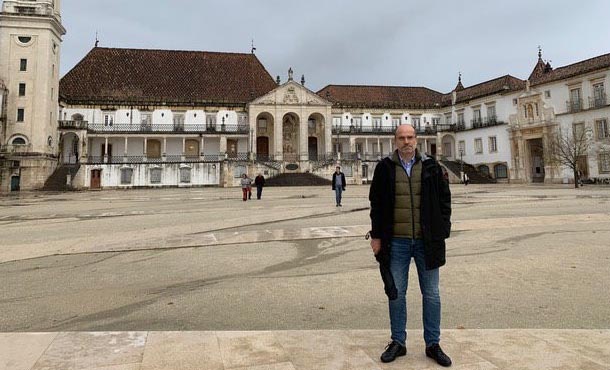
The Fulbright Program, which operates in 160 countries, is the U.S. government’s flagship international educational exchange program and is designed to build lasting connections between the people of the United States and the people of other countries. IMAGE: ENRIQUE DEL CASTILLO
Engineering professor optimizes chemical manufacturing processes on Fulbright
2/3/2020
By Miranda Buckheit
UNIVERSITY PARK, Pa. — Enrique Del Castillo, distinguished professor of industrial engineering and professor of statistics at Penn State, has returned from his Fulbright U.S. Scholar Program, where he conducted research at the University of Coimbra in Coimbra, Portugal.
Awarded by the J. William Fulbright Foreign Scholarship Board, Del Castillo was one of approximately 800 U.S. citizens selected to take their expertise abroad for the 2019-20 academic year through the program. Recipients of Fulbright Awards are selected on the basis of academic and professional achievement, as well as record of service and demonstrated leadership in their respective fields.
The research project for which he was granted the Fulbright Fellowship, titled “Optimization and control of industrial production processes by active learning methods based on ‘big’ and complex data,” sought collaborative research between Penn State’s Engineering Statistics and Machine Learning Laboratory and the University of Coimbra’s chemometrics group in the Department of Chemical Engineering.
Del Castillo worked on the optimization of production processes via machine learning for various industries with the chemometrics group; in particular, they focused on wine, paper and pharmaceuticals.
“I was utilizing statistical analysis and mathematical models to predict changing operating conditions,” Del Castillo said. “There are large data sets that can be used to optimize chemical processes like wine making, paper manufacturing and pharmaceutical drug production. Data science and machine learning create a wealth of opportunities for cost savings and overall efficiency.”
Del Castillo explained that chemical engineers have very similar production and quality problems to industrial engineers; however, their products are created in a process called continuous flow manufacturing. Different from discrete manufacturing, like the creation of cars and smartphones where there are breaks in the production, continuous flow manufacturing is continuously processing materials with no disruptions in time or sequence.
“It was very interesting to work with the chemical engineers because of these shared problems in manufacturing,” Del Castillo said. “The chemometrics group members are specialists in measurement, which isn’t easy. You need the technology and the know-how to work within this field, so I was glad to help them in this very technical area.”
Del Castillo’s research is primarily on statistics and machine learning of complex systems, specifically on process optimization and experimental design, time series analysis and control and bayesian statistics. He also has interests in large-scale spatial and functional data modeling, statistical learning theory and manifold learning.
“It was a great opportunity to go on this trip because the competition to receive a Fulbright Award is rather tough,” Del Castillo said. “When you are going on a Fulbright Award, you are a representative of the United States. I wanted to make the most of my time while there, so I gave talks about my work and Penn State to interested students and industry. It was a rich experience and I learned so much about their culture.”
Since its establishment in 1946 under legislation introduced by the late U.S. Sen. J. William Fulbright of Arkansas, the Fulbright Program has given more than 390,000 students, scholars, teachers, artists and professionals of all backgrounds and fields the opportunity to study, teach and conduct research, exchange ideas and contribute to finding solutions to shared international concerns.



